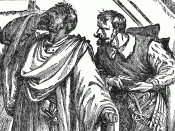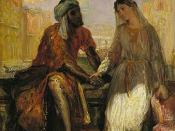In William Shakespeare's Othello, the character Emilia suggests that the other characters of the play represent "heaven and men and devils," loosely setting up the format of the entire work, and summed up clearly in the final scene. There are characters that distinctly represent each of these realms, as well as some that seem to have characteristics from two of the areas. Desdemona is the character most closely associated with heaven as is represented by her goodness throughout the play, even when faced with her own death. Iago clearly represents the devils: he goes out of his way to cause problems for others without any clear motive. Othello is representative of the realm of man, so easily influenced by outside forces and torn between the rewards of heaven and the temptations of hell.
Desdemona's character has many aspects that create an impression of a Christ-like figure. She is always good, no matter what temptation she is faced with.
When she realizes that she is suspected of adultery, she brings it into conversation with her trusted friend and servant Emilia. Emilia says she would not consider it a sin to betray her husband in such a way, "In troth, I think I should [do it]â¦" (4.3.73.). Desdemona, even presented with her best friend's advice that this would not be a bad thing, cannot comprehend the sin, saying, "I do not think there is any such woman," (4.3.86.). She takes the blame of her alleged sin, accepting that some may say slanderous things without knowing the truth, much as Jesus accepted the charge that he was a false king and accepted his due punishment. Jesus' purpose in not denying and just accepting was to use his trials to save the people, similar to the way Desdemona tries to save Othello...
![From the Library of Congress: TITLE: Thos. W. Keene. Othello CALL NUMBER: POS - TH - 1884 .O7, no. 1 (C size) [P&P] REPRODUCTION NUMBER: LC-USZC6-58 (color film copy transparency) RIGHTS INFORMATION: No known restrictions on publication. MEDIUM: 1 print (](https://s.writework.com/uploads/9/94760/library-congress-title-thos-w-keene-othello-call-number-pos-thumb.jpg)

